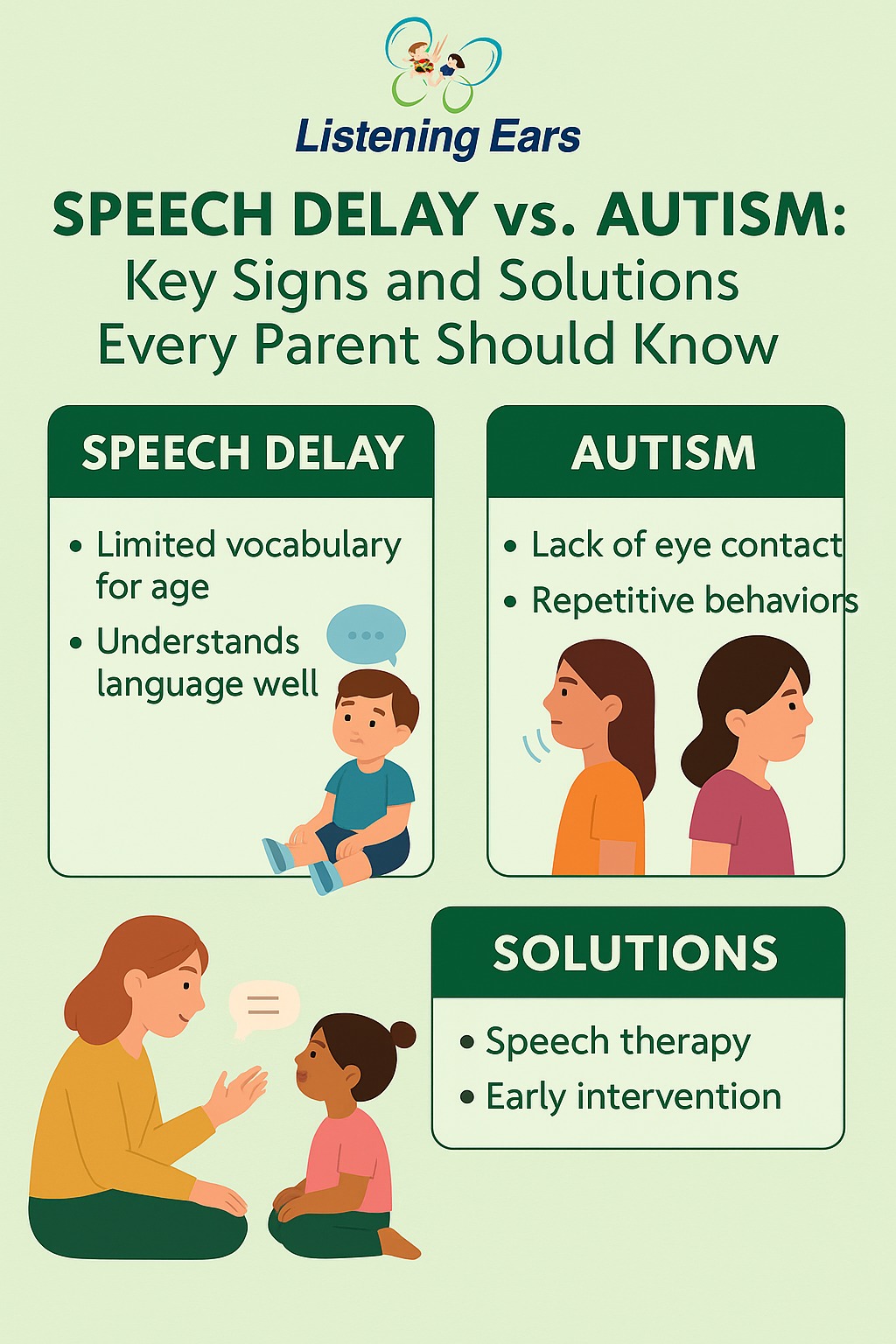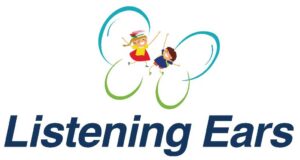
Not all children who talk late have autism. About 5–10% of children experience speech delays, while only 1 in 36 children are diagnosed with autism. Kids with speech delays may learn words slowly, have trouble forming sentences, or repeat sounds, but they usually don’t show the other signs of autism, like difficulty making eye contact or understanding feelings. Studies show that most children with speech delays catch up with the right support. Parents can help by talking, reading, and singing with their child, checking their hearing, and consulting a speech-language therapist if needed. With early help, children with speech delays can catch up and communicate clearly.
What Is Speech Delay?
Some children talk later than others. This is called a speech delay, and it doesn’t always mean a child has autism. While children with autism often have speech delays, many children without autism also experience them. The difference is in how they interact with people and their environment.
How Speech Delays in Autism Are Different
Children who are not autistic usually:
- Enjoy social interaction and smiles
- Copy behaviors of people around them
- Look at people more than objects
- Feel restless when left alone
Children with autism often:
- Focus more on their own interests than on social interaction
- Rarely copy others’ behaviors
- Watch objects more than people
- Prefer playing alone

Not all children who talk late have autism. About 5–10% of children experience speech delays, while only 1 in 36 children are diagnosed with autism. Kids with speech delays may learn words slowly, have trouble forming sentences, or repeat sounds, but they usually don’t show the other signs of autism, like difficulty making eye contact or understanding feelings. Studies show that most children with speech delays catch up with the right support. Parents can help by talking, reading, and singing with their child, checking their hearing, and consulting a speech-language therapist if needed. With early help, children with speech delays can catch up and communicate clearly.
What Is Speech Delay?
Some children talk later than others. This is called a speech delay, and it doesn’t always mean a child has autism. While children with autism often have speech delays, many children without autism also experience them. The difference is in how they interact with people and their environment.
How Speech Delays in Autism Are Different
Children who are not autistic usually:
- Enjoy social interaction and smiles
- Copy behaviors of people around them
- Look at people more than objects
- Feel restless when left alone
Children with autism often:
- Focus more on their own interests than on social interaction
- Rarely copy others’ behaviors
- Watch objects more than people
- Prefer playing alone
These differences help parents and teachers understand if speech delays may be related to autism or other causes.
Real Stats About Speech Delays
- 6% to 16% of children under 3 years in India have speech or language delays
- About 15% of children aged 18–35 months have early speech delays
- Autism affects roughly 1 in 65 Indian children aged 2–9 years
- Boys are more often affected than girls
- Untreated speech delays can cause difficulties later in reading, school, and social skills
Examples to Understand Better
- Child A: Doesn’t speak much but uses gestures, points, and interacts with family. Likely has a speech delay but is socially engaged.
- Child B: Knows a few words but repeats them to self, doesn’t use gestures, and avoids social interaction. Could show early signs of autism.
Speech Delay vs. Autism: Comparison Table
| Characteristic | Speech Delay (Without Autism) | Speech Delay with Autism |
| Social Interaction | Enjoys social interaction, smiles, and engages with others | Focuses more on own interests than social interaction |
| Eye Contact | Makes regular eye contact with people | May avoid or have difficulty with eye contact |
| Imitation Behavior | Copies behaviors of people around them | Rarely copies others’ behaviors |
| Attention Focus | Looks at people more than objects | Watches objects more than people |
| Response to Isolation | Feels restless or upset when left alone | Prefers playing alone |
| Use of Gestures | Uses gestures, points, and nonverbal communication | Limited or no use of gestures for communication |
| Understanding Feelings | Generally understands and responds to emotions | Difficulty understanding or responding to feelings |
| Social Engagement | Socially engaged despite speech challenges | Avoids or shows limited social interaction |
Potential Long-Term Impacts of Untreated Speech Delays
| Area Affected | Consequences Without Treatment |
| Reading Skills | Difficulty learning to read at grade level |
| Academic Performance | Struggles in school subjects requiring language skills |
| Social Skills | Challenges making friends and participating in group activities |
| Confidence | Lower self-esteem and reduced willingness to communicate |
How to Help Children With Speech Delays
- Talk, read, and sing with your child daily
- Encourage gestures and simple words
- Get a hearing check to make sure your child can hear clearly
- Consult a speech-language therapist if delays continue
- For additional support, occupational therapy can improve motor and sensory skills, which also help communication
Early support gives children the best chance to catch up, speak clearly, and feel confident socially and in school.
A Glimpse from Our Recent Awareness Drive
Listening Ears recently conducted a Parent Awareness Workshop at Oishi Care, focusing on how to identify early signs of speech delay and autism. The session included live demonstrations by speech-language experts on interactive play and simple home-based exercises that help toddlers improve communication. Parents found the event insightful and comforting, especially in understanding when to seek professional help.
Inside Our Clinical Expertise
The multidisciplinary team at Listening Ears brings together speech therapists, audiologists, and child psychologists who design personalized programs for children with delayed speech and social communication challenges. Each plan focuses on helping children build clear speech, better social interaction, and classroom readiness through fun, evidence-based techniques.
Final Thoughts
Speech delays are common and don’t always mean autism. With early help, the right therapies, and support at home and school, children can improve their speech and communication skills. Families in Delhi or nearby areas can rely on Listening Ears, a professional hearing and speech support center, to guide children through early interventions and hearing checks.
FAQ's
What is a speech delay?
A speech delay happens when a child starts talking later than other children their age or has trouble using words and sentences correctly. It can affect how well they express themselves and communicate with others.
Does speech delay always mean autism?
No, speech delay does not always mean a child has autism. Many children have speech delays due to hearing problems, slower language development, or other developmental factors.
How common are speech delays in children?
Speech delays are quite common. Around 6%–16% of children under 3 years old experience some delay in learning to talk, though most catch up with support.
When should I get my child checked?
You should consider a check-up if your child isn’t speaking any words by age 2 or shows very little interest in communicating with others. Early evaluation by a speech therapist or audiologist can help identify and treat the problem quickly.
Can hearing problems cause speech delays?
Yes. If a child cannot hear clearly, they may have difficulty learning new words or forming sentences. Hearing issues can make speech development slower, even if the child is otherwise healthy.
How can parents help at home?
Parents can support their child by talking, reading, singing, and encouraging gestures or simple words every day. Playing interactive games and responding to attempts at communication also helps the child improve faster.
What therapies help speech delays?
Speech therapy is the main treatment, and occupational therapy can help with related motor and sensory skills. Together, these therapies improve communication, confidence, and social skills in children.
Can children catch up with support?
Yes. Most children with speech delays make great progress with early intervention and consistent support from parents, therapists, and teachers. With proper guidance, they can develop strong language skills and communicate effectively.
